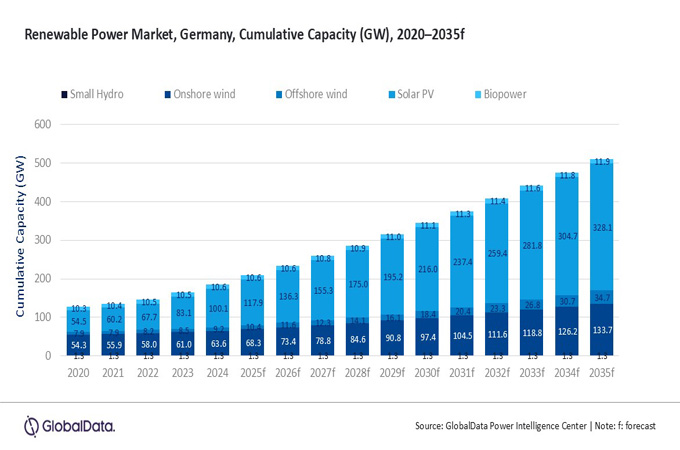Germany is accelerating its clean energy transition with ambitious targets for renewables, hydrogen, and LNG diversification, underpinned by robust federal policies.
The country has officially phased out nuclear power as of 2023 and is committed to phasing out coal-fired generation by 2038, with discussions underway to advance the deadline to 2030.
Against this backdrop, Germany’s cumulative renewable power capacity is forecast to reach 509.9 GW in 2035, with a compound annual growth rate (CAGR) of 9.7 per cent during 2024–35, according to GlobalData, a leading data and analytics company.
GlobalData’s report, “Germany Power Market Trends and Analysis by Capacity, Generation, Transmission, Distribution, Regulations, Key Players and Forecast to 2035,” reveals that in 2024, renewables accounted for 54.7 per cent of Germany’s electricity generation, led by wind and solar PV.
By 2035, renewable generation is expected to reach 628TWh, accounting for 82.9 per cent of the power mix, driven by large-scale solar PV expansion and onshore and offshore wind development.
Mohammed Ziauddin, Power Analyst at GlobalData, comments: “Germany is targeting 80 per cent renewable generation by 2030, supported by its Renewable Energy Act (EEG), National Hydrogen Strategy, and significant investment in grid modernisation. The country targets 30 GW of offshore wind capacity by 2030. Complementary policies such as the Power Plant Security Act and H2Global are creating certainty for renewable investors and hydrogen developers.”
Germany’s energy transition is also being shaped by geopolitical dynamics.
The Russia–Ukraine war accelerated the end of Russian gas imports, leading to rapid expansion of LNG import capacity and diversification of suppliers, including Norway, the Netherlands, Belgium, and the US.
At the same time, Germany is forging hydrogen partnerships with countries such as Canada, Norway, and Namibia to secure future energy supplies.
Challenges remain in terms of grid congestion, Dunkelflaute (periods of low renewable output), and slow rollout of dispatchable gas-fired capacity to back up intermittent renewables.
Rising energy prices, regulatory uncertainties, and lengthy permitting processes for wind projects also constrain deployment. However, large-scale investments in hydrogen infrastructure, battery energy storage, and smart grids are expected to strengthen long-term system resilience.
Zia concludes: “Germany’s pathway to 80 per cent renewables by 2030 and a fully decarbonised power sector by 2045 is ambitious but achievable. With solar, wind, and hydrogen leading the transformation, complemented by grid modernisation and storage investments, Germany is positioned to remain at the forefront of Europe’s energy transition despite geopolitical and structural challenges.” -OGN/ TradeArabia News Service































